It’s probably a fair bet that most people believe computers are already more intelligent than us. But even computationally it’s possible our smartphones will be smarter than us in five to ten years. Even if it hasn’t happened by then, it will happen. Something that was impossible a few decades ago, that would have cost billions if it had been possible, will soon be available at a reasonable price, prepared to sit in your pocket or palm.
As Ted Greenwald of the WSJ recently reminded, smart machines don’t have to make us dumb. From automobiles to digital watches, we’ve always ceded certain chores to technology, but these new machines won’t be anything like the ones we know. They will be by far the greatest tools we’ve ever created. What will that mean, positive or negative? I’m wholeheartedly in favor of them, even think they’re necessary, but that doesn’t mean great gifts aren’t attended by great challenges.
From Vivek Wadhwa at the Washington Post:
Ray Kurzweil made a startling prediction in 1999 that appears to be coming true: that by 2023 a $1,000 laptop would have the computing power and storage capacity of a human brain. He also predicted that Moore’s Law, which postulates that the processing capability of a computer doubles every 18 months, would apply for 60 years — until 2025 — giving way then to new paradigms of technological change.
Kurzweil, a renowned futurist and the director of engineering at Google, now says that the hardware needed to emulate the human brain may be ready even sooner than he predicted — in around 2020 — using technologies such as graphics processing units (GPUs), which are ideal for brain-software algorithms. He predicts that the complete brain software will take a little longer: until about 2029.
The implications of all this are mind-boggling. Within seven years — about when the iPhone 11 is likely to be released — the smartphones in our pockets will be as computationally intelligent as we are. It doesn’t stop there, though. These devices will continue to advance, exponentially, until they exceed the combined intelligence of the human race. Already, our computers have a big advantage over us: they are connected via the Internet and share information with each other billions of times faster than we can. It is hard to even imagine what becomes possible with these advances and what the implications are.•
Tags: Ray Kurzweil, Ted Greenwald, Vivek Wadhwa

